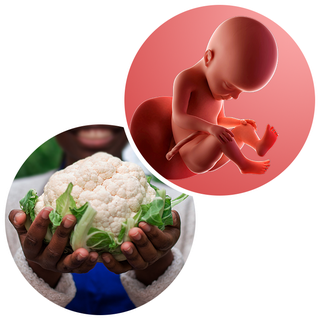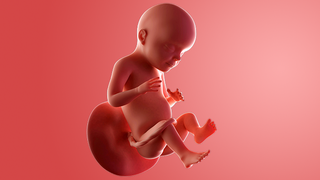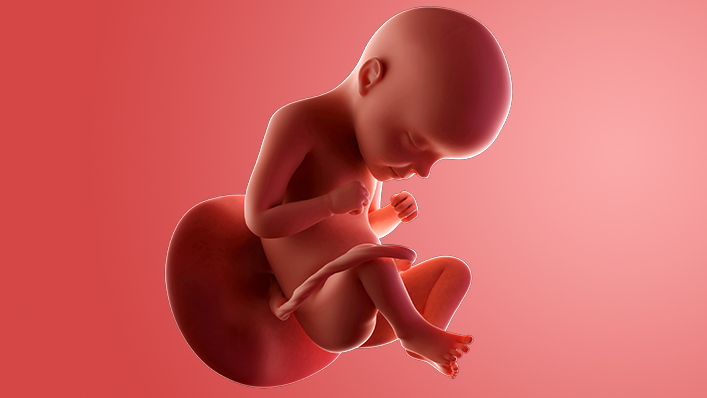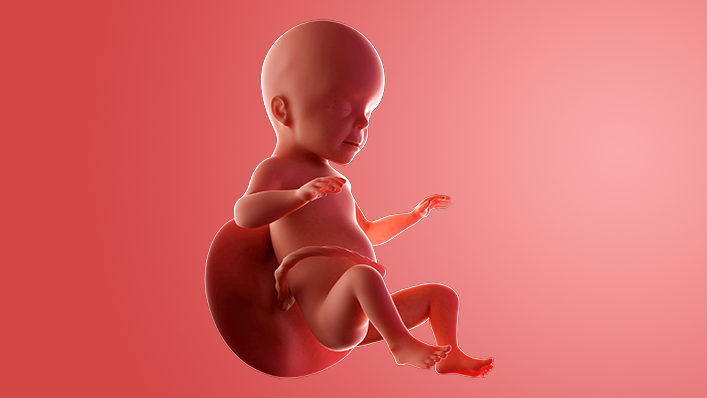- Week 13
- Week 14
- Week 15
- Week 16
- Week 17
- Week 18
- Week 19
- Week 20
- Week 21
- Week 22
- Week 23
- Week 24
- Week 25
- Week 26
- Week 27
Week 27
Congratulations! You've reached the final week of your 2nd trimester and are two-thirds of the way through your pregnancy.
Next week you'll start the 3rd and final trimester.
What's happening in my body?
You're probably putting on a few pounds now, and may be feeling bloated and constipated.
This is partly because your stomach is being squeezed by your growing baby, and partly due to the pregnancy hormone, progesterone.
It might help to drink lots of water, choose high-fibre options (like brown bread and wholewheat pasta, rather than white) and eat lots of fresh fruit and veg.
The best sleeping positions during pregnancy
Should you sleep on your back or side? The NHS guidance says that sleeping on either side is better than sleeping on your back.
That's because after week 28, research suggests that sleeping on your back can double the risk of stillbirth. It's also more likely to give you backache, constipation and piles.
Here are some tips for a safe and sound night's sleep:
- support your baby bump with a pillow
- keep your knees and legs bent
- put another pillow between your legs
- do not worry if you roll onto your back – just roll onto your side again
Fit to fly?
This is probably the last week you can fly anywhere without a "fitness to fly note".
If you need to fly after this week, you will need a note from your midwife or doctor to confirm that your pregnancy is uncomplicated. Check the cut-off dates with your airline.
Find out more about travel during pregnancy.
2nd trimester pregnancy symptoms (at 27 weeks)
You may be feeling tired now, so nap when you can.
You might be snoring more. Snoring is very common in pregnancy as your nasal passages are more likely to become swollen and blocked.
Your signs of pregnancy could include:
- tiredness and sleeping problems (week 19 has information about feeling tired)
- stretch marks (read about stretch marks on week 17's page)
- swollen and bleeding gums (week 13 has information about gum health during pregnancy)
- pains on the side of your baby bump, caused by your expanding womb ("round ligament pains")
- piles (read about piles on week 22's page)
- headaches
- backache
- nosebleeds
- indigestion and heartburn (week 25 talks about digestive problems)
- bloating and constipation (read about bloating on week 16's page)
- leg cramps (week 20 explains how to deal with cramp)
- feeling hot
- dizziness
- swollen hands and feet
- urine infections
- vaginal infections (see week 15 for vaginal health)
- darkened skin on your face or brown patches – this is known as chloasma or the "mask of pregnancy"
- greasier, spotty skin
- thicker and shinier hair
You may also experience symptoms from earlier weeks, such as:
- mood swings (week 8's page has information on mood swings)
- morning sickness (read about dealing with morning sickness on week 6's page)
- weird pregnancy cravings (read about pregnancy cravings on week 5's page)
- a heightened sense of smell
- sore or leaky breasts (read about breast pain on week 14's page) - a white milky pregnancy discharge from your vagina and light spotting (seek medical advice for any bleeding)
What does my baby look like?
Your baby, or foetus, is around 36.6cm long from head to heel. That's approximately size of a head of cauliflower.
Your baby's lungs are now capable of breathing, and your baby is also getting plumper by the day.
A few weeks ago, your baby looked a bit like a wrinkled prune. Now the folds of skin are being filled out by fat, and all their organs are maturing, as your baby prepares for life outside the uterus (womb).

Action stations
Do you know where you would like to give birth? This is a great time to start thinking about it.
If you're concerned about how COVID-19 might affect your birth plan, visit the Royal College of Obstetricians and Gynaecologists for the most up-to-date advice.
This week you could also…
More in week-by-week

Week 28 – the 3rd trimester
Welcome to the 3rd trimester!
More in week-by-week guide to pregnancy


